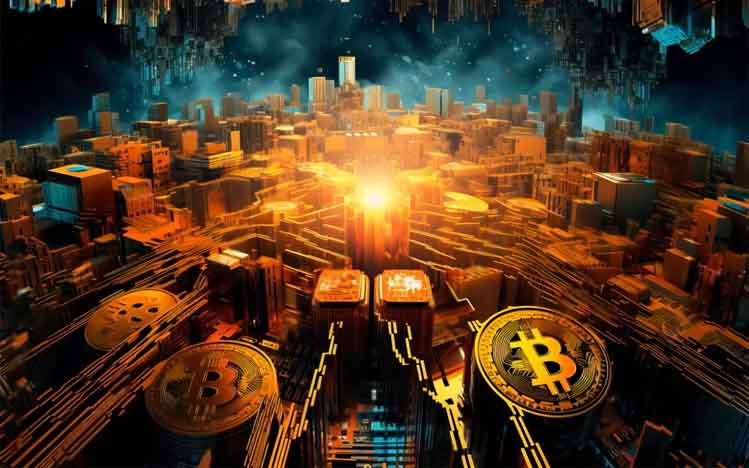
The practice of tokenizing digital assets in the realm of blockchain technology has been widely adopted. Initially, tokenization involved converting valuable entities into digital tokens usable on blockchain platforms. The digital framework supporting asset ownership, transfer, and exchange among individuals has long been established.
However, the scope of asset tokenization has expanded beyond digital assets. Currently, there’s a surge in tokenizing real-world assets (RWA) due to the multitude of benefits it offers. These advantages include access to previously illiquid assets and more stable yields compared to the highly volatile returns observed in DeFi, influenced by crypto market fluctuations.
Yet, beyond these immediate benefits lies a larger prospect—mainstream crypto adoption. Within the industry, many perceive the tokenization of RWAs, representing physical and traditional financial assets, as the bridge that connects blockchain technology to the tangible world.
This trend is gaining momentum. According to the Boston Consulting Group (BCG), the tokenization of global illiquid assets could burgeon into a $16 trillion industry by 2030. A survey by BNY Mellon disclosed that 97% of institutional investors foresee a revolution in asset management through tokenization, with 91% expressing interest in investing in tokenized products.
Given these developments, companies must collaborate with leaders in this field. Blockchain App Factory acknowledged as a pioneer in the blockchain industry, distinguished for its expertise in DeFi asset tokenization, has actively contributed to developing enterprise blockchain solutions, offering concrete pathways for asset tokenization, including RWAs.
Insights into RWA Tokenization
Real-world assets encompass various regulated financial instruments—equities, bonds, investment funds, loans—alongside tangible commodities like gold, silver, real estate, and other precious metals, artworks, or sports teams.
Many of these assets pose challenges in physical transfer or division, often entangled in complex legal procedures. Transitioning to a digital system facilitated by blockchain, such as bitcoin, emerges as a more efficient alternative. Tokenizing RWAs facilitates swifter settlements, liquidity provision, and automated compliance, and introduces innovative avenues for credit and investment opportunities.
Tokenization acts as a catalyst, easing entry into real estate investments, allowing smaller investors to participate. In the realm of artwork, fractional ownership offers investors the opportunity to own valuable art pieces without bearing the entire cost. Similarly, fractional ownership opens avenues for flexible licensing agreements regarding tokenized intellectual property rights like patents or copyrights.
For asset managers, this offers new distribution channels for investment funds. Tokenizing debt instruments like bonds or loans fosters a more liquid market, streamlining ownership transfers effectively.
The merits of this approach are manifold:
- Enhanced Liquidity: Fractional ownership simplifies asset stake transactions, augmenting liquidity and broadening the investor base.
- Cost Efficiency: Unlike traditional asset trading, users can bypass broker or administrative fees.
- Transparency: Blockchain maintains transparent ownership records, shedding light on the asset’s transaction history, enhancing accountability.
- Security: Blockchain-based transactions mitigate fraud risks, ensuring secure transactions.
- Global Accessibility: Expanding the investor base facilitates diversified investment portfolios.
The Impact of Tokenization Company
The potential impact of asset tokenization on various industries—efficiency, accessibility, and liquidity—is profound.
As the demand for real-world asset tokenization grows, Blockchain App Factory anticipates assuming a leading role in this wave. As a premier blockchain development company, it provides customers and enterprises with a seamless tokenization solution for RWAs through a reliable platform.
How Does Blockchain App Factory Assist?
- Finalizing Smart Contract Deals: Establishing guidelines for present and future investors precedes the tokenization process.
- Digitizing Assets: Traditional asset information is stored on the blockchain via smart contracts, issuing security tokens.
- Technology Selection: Crucial decisions for RWA tokenization, regarding platform features and the appropriate blockchain, are made collaboratively with clients.
- Token Distribution: Upon the development and deployment of smart contracts, the creation and distribution of tokens commence.
- Post-Tokenization Support: Handling legalities, tracking activities, and providing ongoing support constitute part of Blockchain App Factory’s comprehensive services.
The evolution of asset tokenization, particularly with real-world assets, holds the potential to reshape industries and financial landscapes. As Blockchain App Factory continues to innovate and lead developments in this space, the future of integrating blockchain with tangible assets appears increasingly promising.
For a reliable tokenization platform, Contact Us:
(*)


